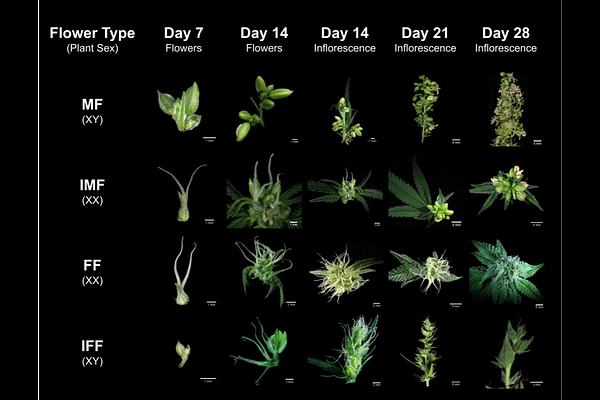Sex-Specific Ethylene Responses and Convergent Plasticity: Multi-Omic Insights into Cannabis Sexual Plasticity

Sex-Specific Ethylene Responses and Convergent Plasticity: Multi-Omic Insights into Cannabis Sexual Plasticity
Monthony, A. S.; Roy, J.; de Ronne, M.; Carlson, O.; Murch, S. J.; Torkamaneh, D.
AbstractCannabis sativa exhibits remarkable sexual plasticity, with both XX and XY plants capable of phenotypic sex reversal in response to ethylene modulation. However, the molecular mechanisms underlying this process remain poorly characterized. Here, we applied a multi-omic framework-integrating transcriptomics, metabolite quantification, and whole-genome sequencing-to study the regulatory basis of ethylene-mediated sexual plasticity across three genetically distinct cannabis genotypes. We show that sex reversal induced by silver thiosulfate (XX masculinization) and ethephon (XY feminization) results in >80% floral sex conversion across genotypes. Despite a shared phenotypic response, transcriptomic analysis of 47 ethylene-related genes (ERGs) revealed a temporally dynamic and sex-specific response: a shared early-phase upregulation of biosynthesis and signaling genes at Day 1, followed by divergent gene expression patterns at Day 14 associated with phenotypic stabilization. Network analysis identified 14 candidate ERGs, including CsMTN, CsACS1, CsACO3, CsACO5 and CsERF1, as key regulators of plasticity. Genomic variant profiling and chromosomal localization further revealed low nucleotide diversity in most ERGs, with several key genes localized exclusively to X chromosome\'s non-recombinant regions and notably, absent from the Y non-recombinant region. Together, our findings demonstrate that ethylene-mediated sex change in C. sativa involves temporally distinct transcriptional programs that differ between XX and XY plants and affirm that sexual plasticity does not exclusively rely on sex chromosome-linked genes. This study provides a high-resolution molecular framework for dissecting and ultimately controlling sexual plasticity in C. sativa, identifies candidate targets for functional validation, and lays the groundwork for breeding sex-stable genotypes in cannabis and other dioecious crops.